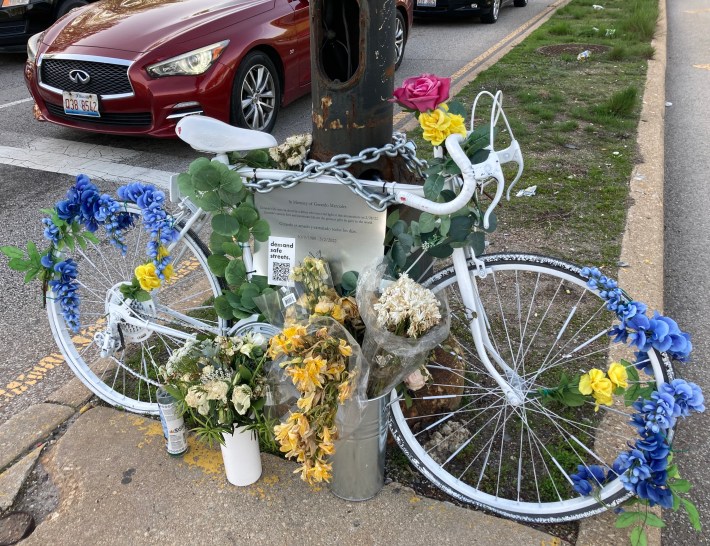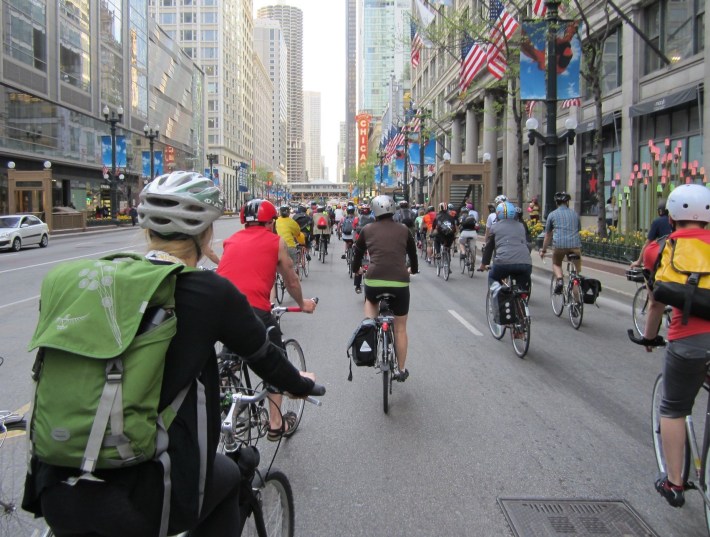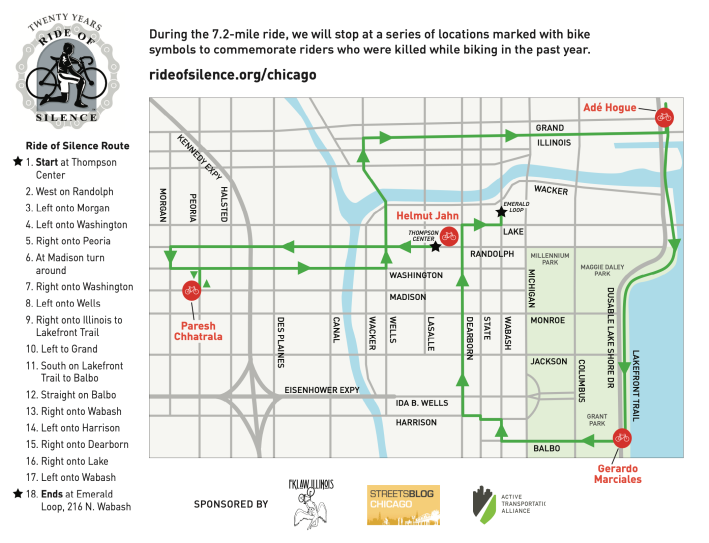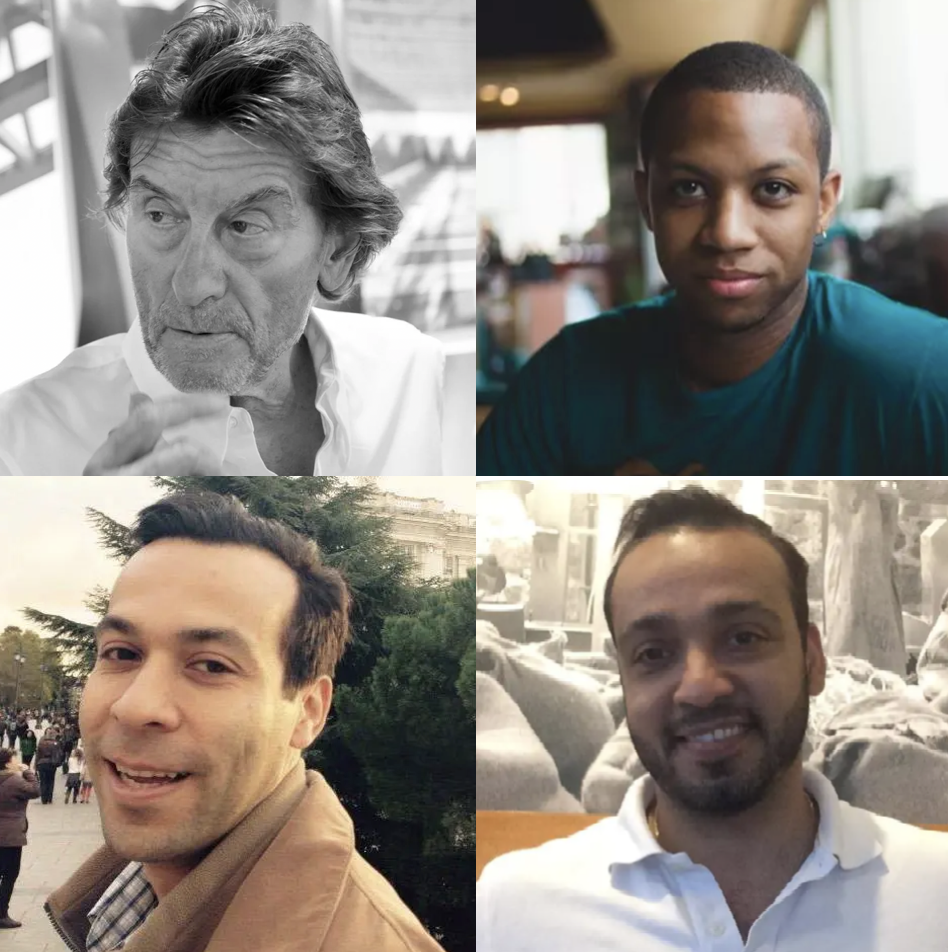It's been a rough past year for Chicagoans who ride bikes. 2021 saw ten cycling fatalities in our city, the most in a decade. The increase in bike deaths was likely attributable in part to increased bicycling during the COVID-19 pandemic, as well as more speeding by drivers during the crisis.
And tragically 2022 has already seen reckless drivers kill three young men on bicycles: technical consulting engineer Gerardo Marciales, 41, on February 28, in the Loop; software engineer Paresh Chhatrala, 42, on April 26 in the West Loop; and barista Nick Parlingayan, 22, on May 4 in Irving Park. See a full list of people fatally struck on bikes in Chicago in the past year at the end of this post.

The 20th annual Chicago Ride of Silence, next Wednesday, May 18, meeting at 5:30 p.m. at the Thompson Center, 100 W. Randolph St. in Chicago, is an opportunity to mourn and reflect on these losses. It's part of a global movement to honor people killed and injured on bicycles, and demand legislative and infrastructure changes to keep bike riders safe.
The 7.2 mile ride will start at the Thompson Center and visit the sites of three recent downtown bike fatality crashes, including the locations where Marciales and Chhatrala were struck and killed, as well as the site where a motorist fatally struck bike racer and graphic designer Adé Hogue, 32, on October 27, 2021 on the Near North Side. The event will also memorialize Thompson Center architect Helmut Jahn, 81, who died in a bike crash on May 8, 2021 in west-suburban Compton Hills.
"The Ride of Silence honors victims everywhere in a such a powerful way – in silent memorial," said longtime Chicago organizer Elizabeth Adamczyk. "It’s a universal way to respect our fallen riders and their family/friends. In our silent procession we commemorate victims while calling attention to the rights of people to safely ride their bikes on our public roadways. We also highlight and advocate for the importance of safer roadway design."

Chicago Ride of Silence
Meet at 5:30 p.m., depart at 6.
Thompson Center, 100 W. Randolph St., Chicago
Endpoint: Emerald Loop tavern, 216 N. Wabash St.
Free
People of all ages are welcome to participate, and no pre-registration is needed. The ride will travel at about 8 mph, and attendees are encouraged to keep a contemplative silence during the trip. Along with the Active Transportation Alliance and FK Law, this year Streetsblog Chicago is a sponsor of the even and helped create the route map below, also available as a Google Map.

Streetsblog reached out to many of Chicago's sustainable transportation advocacy organizations to get their thoughts on why the Ride of Silence is important. Here are their statements.
Active Transportation Alliance
"Active Transportation Alliance is honored to sponsor the Chicago Ride of Silence and Streetsblog Chicago on this ride. This year and every year, the ride is an opportunity for all of us to reflect on and remember our friends and neighbors who we lost in preventable traffic crashes. The surge in traffic crashes and deaths we’ve seen during the pandemic is tragic and unacceptable. City and state officials need to do more to redesign our streets for safety and build high-quality bike infrastructure – specifically a citywide network of connected and protected bike lanes. The current patchwork approach featuring paint and plastic clearly isn’t working."
“It’s so important for us to take time to remember and mourn those who we’ve lost to traffic violence. More than just headlines, these are people. Our neighbors, friends, family – lives cut short because of the failures of our City and State. We’re grateful for those who have organized the Ride of Silence, and hope that this can be a time where we can come together to not only remember but further unite our community in demanding the safe streets we know we deserve.”
"Equiticity supports the upcoming Ride of Silence, as well as any and all efforts to reduce traffic violence in a way which is racially equitable and just. In Chicago, like many cities across the U.S., Black and Brown people are the most disproportionately impacted by traffic violence. This deadly inequity is further compounded by other severe racialized inequities, such as police enforcement, unemployment, poverty, interpersonal violence, and sustained disinvestment in our neighborhoods. Two critically important remedies for transportation inequities are: 1) the wholesale re-engineering of our streets which reflect our history, culture, and needs, and 2) investment in the social infrastructure of community bicycle rides, neighborhood walking tours, public transit excursions, group scooter rolls, and Ciclovia-style open streets festivals, helping socialize people around the act of mobility."
"The Ride of Silence honors cyclists who have paid the ultimate price for a transportation system that does not prioritize vulnerable users over cars. This event is important to continue to raise awareness of the ongoing serious transportation safety issues that face cyclists daily and that must be addressed urgently. The loss every cyclist’s life is all the more tragic because that person was choosing to move about the city in a way that was environmentally friendly, healthy, space efficient and did not pose risk to others. It is good for our city to have more people cycling, but we must make sure they are safe while doing so."
"Available crash data and gut-wrenching news stories have highlighted the reality that crashes and fatalities on Illinois roads continue to rise. While it doesn’t solve the problem, the annual Ride of Silence is a somber, meaningful opportunity to honor those who have injured or killed while riding a bike on public roadways. The event raises awareness of the profound impact that traffic violence has on individuals, families, and entire communities. Ten Illinois communities are hosting Rides of Silence in 2022 and we encourage Streetsblog readers to participate in order to make a silent statement to those they pedal past… in silence."
"The Ride of Silence is a heart-wrenching experience. Many lost cyclists are so young. They have nicknames. Their friends and families remember them with stories, even as the plastic flowers wilt over the years and the bent white tires rot away. In remembrance of them, DO SOMETHING to stop the carnage. Act! Build protected bike lanes so that those souls who help protect our planet can be safe and remain in the warm embrace of their loved ones rather than be remembered through a veil of tears. Joining the Ride of Silence is a step in the right direction."
People killed on bikes in Chicago in the past year.
- Kevin Clark, 32, May 26, 2021 in Logan Square
- Thomas Travers, 59, July 24 ,2021 in Jefferson Park
- George Sawicki, 70, August 17, 2021 in South Loop
- Jason Hardt, 48, September 12, 2021 in North Lawndale
- Adé Hogue, 32, October 27, 2021 on the Near North Side
- Robert Earl Moore, 59, November 15, 2021 in Back of the Yards
- Jose Velásquez, 16, December 10, 2021 in Back of the Yards
- Gerardo Marciales, 41, February 28, 2022 in the Loop
- Paresh Chhatrala, 42, April 26, 2022 in West Loop
- Nick Parlingayan, 22, May 4, 2022 in Irving Park




